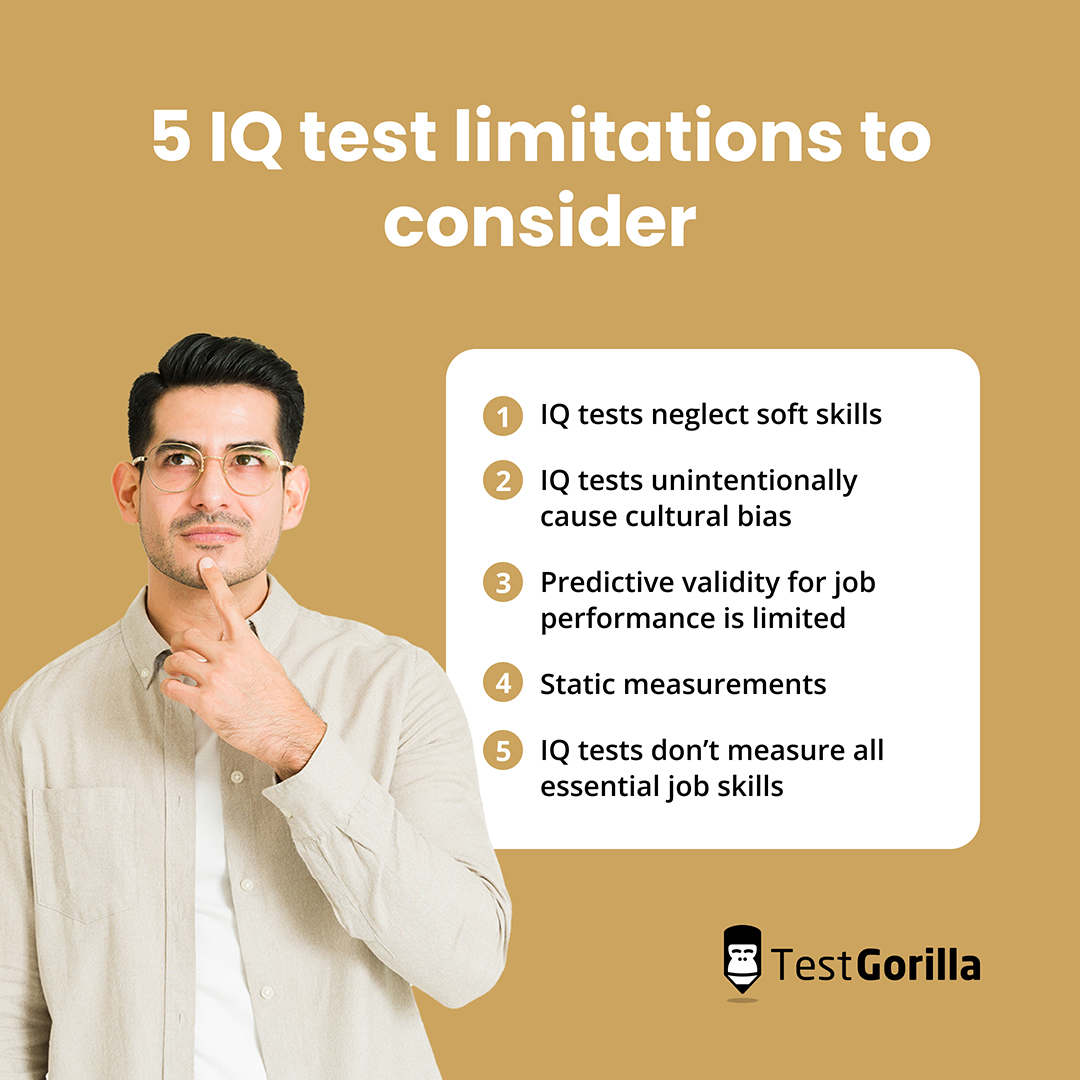Hiring the most book-smart candidate with the highest IQ score in your applicant pool doesn’t necessarily mean they will be a top-performing employee.
Although they may know and understand the theories and methods needed to excel, they may lack other essential skills to effectively carry out the functions of the role, such as time management and communication.
Lacking these vital soft skills can negatively affect your firm’s productivity and customer experience, which can lead to an impact on your company’s revenue.
In this article, we’ll examine the accuracy and reliability of IQ tests in the hiring process, and some trusted alternatives you can add to your recruitment arsenal.
Table of contents
What is an IQ test?
An IQ test is an assessment that measures your candidate’s intelligence and intellectual potential on a scale of 60 to 145. It’s designed to test a range of brain functions such as problem-solving, spatial recognition, logical reasoning, and language comprehension.
The test usually has a series of questions that vary in difficulty. As your candidates complete these questions, their responses are scored and analyzed to generate an IQ score. This score is then compared to the results of a larger population to confirm where they rank.
According to the Personality Test Center, the average IQ score of the general population is 100. In adults, the average IQ score ranges from 100 to 130.
Scores greater than 100 are categorized as above average whereas those less than 100 indicate the opposite. Below are the different IQ classifications from highest to lowest and their test score ranges:
Very superior (130 and above)
Superior (121-130)
High average (111-120)
Average (90-110)
Low average (80-89)
Borderline (70-79)
Extremely low (below 70)
IQ tests are designed to be age-specific, meaning you can compare the scores of individuals of the same age group.
How accurate are IQ tests?
Although IQ tests seemingly display a scientific level of precision due to their testing and scoring method, their overall accuracy is still questionable. They don’t paint a complete picture of your candidate’s true potential. Let’s look at the reasons why.
An IQ score only measures one specific subject matter at a time
IQ tests present you with a number indicative of your candidate’s smarts, but they don’t provide a comprehensive assessment of a person's overall intelligence or potential. For example, IQ scores don't account for other skills and qualities that contribute to a candidate's success, such as creativity, practical knowledge, and adaptability.
IQ tests are standardized and can measure your candidate’s cognitive abilities accurately but only within the scope of the test's content.
For instance, the results of an IQ test may provide insights into a candidate’s intellectual abilities for an accounting or analytics role, but their ability to solve a math problem doesn’t mean they will perform well in other important aspects of the position, such as working in a team, having strong interpersonal skills, or being organized.
IQ tests don’t examine all factors that affect intelligence and performance
There are a number of factors that influence job performance. Soft skills like teamwork, communication, emotional intelligence, and adaptability play important roles for success in the workplace.
Additionally, job-specific demands and the culture of the organization can significantly impact a person's effectiveness, even if they score highly on an IQ test. These tests don’t measure personality fit, culture add, or job-specific skills – all of which are essential factors to examine when considering a candidate for an open role.
While IQ tests can provide insights about your candidate’s cognitive strengths and weaknesses, they aren’t an accurate representation of your candidate’s overall intelligence. Therefore, you’ll want to use them carefully – and not as the sole determinant when making hiring decisions.
For a more accurate and well-rounded evaluation of a candidate's suitability for a role, consider a broader range of factors, including personality traits, skills, experience, and cultural fit.
Are IQ tests useful for hiring?
Not necessarily. Due to their limitations, IQ tests can prove to be less useful in the hiring process depending on the role’s requirements. For example, roles that involve complex decision-making, data analysis, research, and problem-solving need individuals with problem-solving skills, logical reasoning, and critical thinking.
In this context, an IQ test could be a helpful assessment tool to measure your candidate’s cognitive abilities, but it doesn’t predict their ability to perform well.
Relying solely on IQ tests for hiring decisions comes with several limitations that can impact the accuracy and fairness of the selection process. Here are five to consider:
1. IQ tests neglect soft skills
Many roles require strong interpersonal skills, teamwork, adaptability, and effective communication. IQ tests don’t assess these soft skills, which are crucial for collaborating with colleagues, understanding customer needs, and navigating diverse work environments.
2. IQ tests unintentionally cause cultural bias
IQ tests may inadvertently favor certain cultural or socio-economic backgrounds. Questions and contexts within the tests might be more familiar to certain groups, leading to potential bias in scores. This can result in a lack of diversity in hiring and overlooking talented candidates from different backgrounds.
3. Predictive validity for job performance is limited
While IQ tests measure cognitive abilities, their direct correlation with job performance can be limited. Different roles require different skills and qualities, and a high IQ doesn’t necessarily guarantee success in a specific job.
For example, IQ scores might not accurately predict how well a candidate can apply their cognitive skills in real-world work scenarios.
4. Static measurements
IQ tests provide a snapshot of cognitive abilities at a specific point in time. They don’t account for a candidate's potential to learn and grow on the job. Individuals can learn and develop skills, adapt to new challenges, and make positive improvements over time – aspects IQ tests fail to capture.
5. IQ tests don’t measure all essential job skills
An IQ test may not accurately capture other important skills and qualities your candidate needs for success, such as emotional intelligence, creativity, interpersonal skills, and practical knowledge.
Many positions also require job-specific skills that IQ tests simply can’t evaluate. For example, in roles requiring specific technical skills and domain expertise, your candidate may need to be versed in SQL for data analytics, which makes IQ testing obsolete in this context.
This is why relying on IQ tests to make hiring decisions can be problematic. You run the risk of overlooking candidates with the skills and qualities that would diversify and add value to your team.
If you’re still considering using IQ tests to assess your candidates, integrate them into a multilevel testing approach. This alternative method assesses a broader range of factors when recruiting, so you can make a more informed decision and hire top talent.
Alternatives to IQ tests: The multilevel approach
Given the limitations of IQ tests, you may want to explore a more comprehensive approach to hiring – one that goes beyond measuring cognitive abilities and instead focuses on hard and soft skills testing. This multilevel approach provides a data-driven and holistic view of candidates and their suitability for a role. Here's how it works:
Personality tests help you determine where candidates fit in
Use personality testing to understand a candidate's personality type and traits. This is key to predicting how well they'll fit within your team and company culture. You can learn more about your candidates’ communication styles, interpersonal skills, and how they might handle various work scenarios.
TestGorilla’s extensive test library offers effective personality tests that are great for all job roles.
Big 5 (OCEAN): This personality and culture test helps you evaluate your candidate’s openness, conscientiousness, extroversion, agreeableness, and emotional stability – the five dimensions of personality.
Enneagram: This test helps you identify which of the nine Enneagram personality types your candidate portrays and gives you an idea of their worldviews and how they operate as a result.
16-Types: This test helps you understand how your candidate processes information and makes decisions. This is a great pre-interview assessment if you’re searching for specific personality traits for an open role.
Job-specific evaluations confirm skills and knowledge
One size doesn't fit all when it comes to job roles. Job-specific skills testing involves assessing candidates on tasks and challenges directly related to the position they're applying for.
For example, you’d want to evaluate the language and communication skills of your sales representative candidates just as you would assess the mathematical skills of an actuarial scientist.
Job-specific skills testing indicates how well candidates can translate their skills and knowledge into practical, job-related tasks.
Ask behavioral interview questions specific to your organization’s needs
Tailoring interview questions to your industry and the specific requirements of the role helps you assess a candidate's relevant knowledge and problem-solving abilities.
Behavioral interview questions showcase a candidate's ability to apply their expertise to real-world situations, giving you valuable insights into their potential performance.
Improve your hiring strategy with a multilevel approach
A multilevel approach creates a more accurate and well-rounded assessment of a candidate's capabilities. It shifts the focus from simply measuring cognitive abilities to evaluating their overall fit for the role and the team.
By adopting this approach, you're not only making more informed hiring decisions but also removing bias from the hiring process and mitigating the risks associated with misaligned hires.
This method enables you to identify candidates who possess the intellectual skills for the job, exhibit the right personality traits, and have a track record of excelling in similar contexts.
Adopt TestGorilla’s multilevel approach for accurate hiring decisions
An IQ test provides an indication of your candidate’s intelligence. However, used as the sole basis for making a hiring decision leaves gaps in the evaluation process. IQ tests don’t take into account soft skills, culture add, or job-specific skills, making them a less accurate measurement for hiring purposes.
Embracing a multilevel approach empowers you to make hiring decisions that consider a broader spectrum of qualities, setting the stage for building a high-performing and harmonious team.
Ready to step into the new era of recruitment? TestGorilla offers a range of research-backed assessment tools that cater to data-driven, bias-free, and holistic hiring practices.
Learn more about how you can attract, identify, and retain top talent by exploring our comprehensive guides and innovative products. Take a quick product tour to find out more or sign up for a free plan today.
Related posts
Hire the best candidates with TestGorilla
Create pre-employment assessments in minutes to screen candidates, save time, and hire the best talent.
Latest posts
The best advice in pre-employment testing, in your inbox.
No spam. Unsubscribe at any time.

Hire the best. No bias. No stress.
Our screening tests identify the best candidates and make your hiring decisions faster, easier, and bias-free.
Free resources
This checklist covers key features you should look for when choosing a skills testing platform
This resource will help you develop an onboarding checklist for new hires.
How to assess your candidates' attention to detail.
Learn how to get human resources certified through HRCI or SHRM.
Learn how you can improve the level of talent at your company.
Learn how CapitalT reduced hiring bias with online skills assessments.
Learn how to make the resume process more efficient and more effective.
Improve your hiring strategy with these 7 critical recruitment metrics.
Learn how Sukhi decreased time spent reviewing resumes by 83%!
Hire more efficiently with these hacks that 99% of recruiters aren't using.
Make a business case for diversity and inclusion initiatives with this data.


















